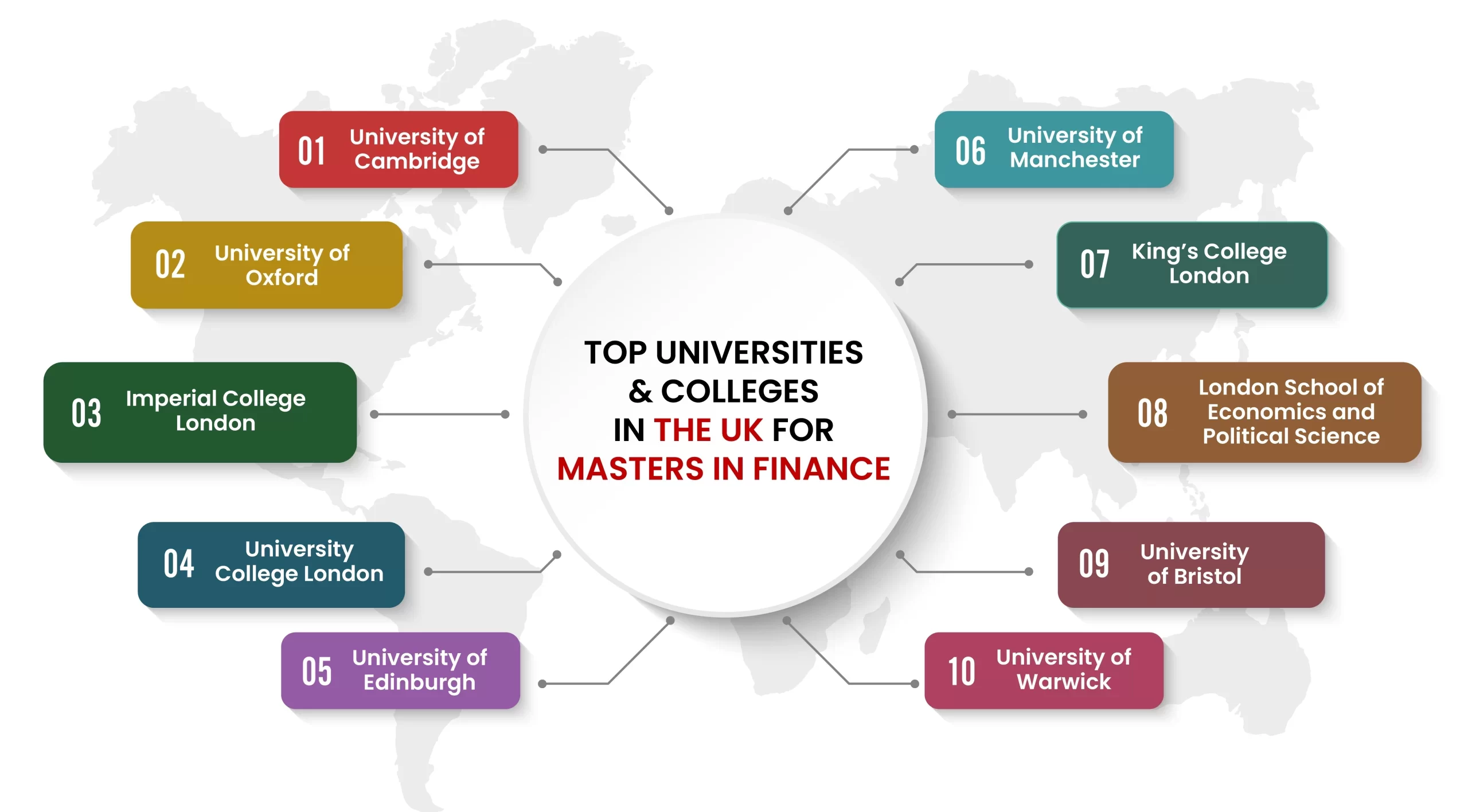Pursuing higher education abroad is still a dream for many students, but pursuing a Masters in Finance in the UK is not just a dream; it becomes a destination for those who have a craze for numbers and management. Off the top of one’s head, the primary reasons for making the UK a destination place were their good reputation in the education system and their easy landing on a job. But these two reasons won’t suffice to move to the UK.
Hence, this blog would brief out the exact details of the required and wind up with some answered questions for better nuances.
Table of Content
1Why Study Masters in Finance in the UK2Top Universities & Colleges in the UK3Eligibility Criteria to Study Masters in Finance in the UK4Masters in Finance in the UK Requirements5Cost of Studying in the UK6Scholarships offered in the UK7Job scope after the Masters in Finance in the UK8Frequently Asked Questions ( FAQ )
Why Study Masters in Finance in the UK
-
Top Universities
Universities in the UK are placed in global rankings, and some of the ranked universities are the University of Oxford, the University of Cambridge and so on.
-
Specialized Programs
UK universities offer courses such as international financial reporting, risk management, and so on, which are of an updating and upgrading nature.
-
Flexible VISA
The UK student visas allow international students to work 20 hours per week part time and renumeration will take care of their basic needs.
-
Employability
Top firms such as JP Morgan, Moody, Allianz, etc. actively recruit finance graduates.
-
On-going Demand
The world is globalizing day-by-day, and the role of financial experts will become inevitable.
Top Universities & Colleges in the UK

The United Kingdom is home to most of the public universities, and they offer a range of master’s courses in the UK. The following table lists the top universities to pursue a master’s in finance in the UK, as per QS World Rankings (2024):
| S.No | QS World Rankings (2024) | Universities | Program | Duration |
| 1 | 2 | University of Cambridge | Master of Finance | 1 Year |
| 2 | 3 | University of Oxford | M.Sc (Financial Economics) | 9 months |
| 3 | 6 | Imperial College London | M.Sc (Finance) | 1 Year |
| 4 | 9 | University College London | M.Sc (Finance) | 1 Year |
| 5 | 22 | University of Edinburgh | M.Sc (Finance) | 1 Year |
| 6 | 32 | University of Manchester | M.Sc | 1 Year |
| 7 | 40 | King’s College London | M.Sc (Corporate Finance) | 1 Year |
| 8 | 45 | London School of Economics and Political Science | M.Sc (Finance) | 10 months |
| 9 | 55 | University of Bristol | M.Sc (Finance & Investment) | 1 Year |
| 10 | 67 | University of Warwick | M.Sc (Finance) | 1 Year |
Eligibility Criteria to Study Masters in Finance in the UK
There are certain prerequisites for international students to study in the UK for masters. Following are the prerequisites to pursue master degree in the UK:
-
Credentials
Bachelor degree in the relevant field such as Mathematics, Finance, Science, Economic (or) Engineering with a minimum of 60%, along with HSC and SSLC.
-
Language Proficiency Tests
For international students, it is a mandated criteria to attach any of the following certifications:
- IELTS
- TOEFL
- Duolingo
-
Experience
Minimum 2 years’ work experience in (or) around financial sector.
-
GMAT/GRE Score
Though GMAT/GRE scores are not mandated, those scores could boost the application further up. So, the minimum scores for GMAT and GRE would be 650 and 320 respectively.
-
Other Documents
- Resume (or) Curriculum vitae (CV)
- Valid Passport.
- Study Visa. If you are unaware of the visa process, try contract CanApprove.
Masters in Finance in the UK Requirements
After fulfilling the eligibility criteria, it is relevant to know about the admission requirement for the intake of masters in the UK. Since the admission criteria are subjective across universities, the following table illustrates the admission criteria and language requirements for the top universities:
| S.No | Universities | Admission Criteria (Bachelors) | Language Proficiency |
| 1 | University of Cambridge | 75% | IELTS – 7.0 | TOEFL – 100 |
| 2 | University of Oxford | 60% | IELTS – 7.5 | TOEFL – 110 |
| 3 | Imperial College London | 70% | IELTS – 7.5 | TOEFL – 110 |
| 4 | University College London | 70% | IELTS – 7.5 | TOEFL – 110 |
| 5 | University of Edinburgh | 60% | IELTS – 7.0 | TOEFL – 100 |
| 6 | University of Manchester | 65% | IELTS – 7.0 | TOEFL – 100 |
| 7 | King’s College | 70% | IELTS – 7.0 | TOEFL – 100 |
| 8 | London School of Economics | 65% | IELTS – 7.0 | TOEFL – 100 |
| 9 | University of Bristol | 60% | IELTS – 6.5 | TOEFL – 88 |
| 10 | University of Warwick | 70% | IELTS – 7.0 | TOEFL – 100 |
Cost of Studying in the UK
Once the student decides to start higher education in the UK, he/she has to consider the most important thing – tuition fee and living accommodation in the UK. The cost factor plays a pivotal role in abroad study. Hence, the following table lists down the tuition fees from top universities in the UK:
| S.No | Universities | Tuition Fee (GBP) |
| 1 | University of Cambridge | 55,080 |
| 2 | University of Oxford | 55,630 |
| 3 | Imperial College London | 45,400 |
| 4 | University College London | 44,400 |
| 5 | University of Edinburgh | 39,500 |
| 6 | University of Manchester | 34,500 |
| 7 | King’s College | 40,140 |
| 8 | London School of Economics | 44,928 |
| 9 | University of Bristol | 39,000 |
| 10 | University of Warwick | 41,750 |
After getting a picture of the UK education costs, one has to consider the accommodation expenses as well. Accommodation costs consist of rent, food, travel, and other miscellaneous costs. Therefore, the average annual cost of living in the UK would be around 15,000 to 18,000 GBP.
Scholarships offered in the UK
International students who decide to pursue a masters in finance in the UK can avail themselves of the scholarships to cut down on the tuition fee, either partially or fully. These scholarships are awarded to students who excel in their academics and help ease the burden. Here are some of the UK scholarships:
- Oxford Said – HEC Montreal Scholarship
- Chevening Scholarship
- Graduate Support Scheme
- UCL Global Masters Scholarship
- Commonwealth Masters Scholarship
- Marshall Scholarship
- Rhodes Scholarship
Job scope after the Masters in Finance in the UK
After completing the masters, the graduates can work across sectors such as banking, IT, insurance, and so on. Also, the top recruiters, such as JP Morgan, Deloitte, KPMG, Allianz, and other prominent players too recruit for their companies. Some of the lucrative job opportunities are:
- Commercial Investment Banker
- Financial Analyst
- Associate Portfolio Manager
- Personal Financial Advisor
- Stockbroker
- Risk Analyst
- Accountant
In a nutshell, pursuing a masters in finance in the UK would not just become a destination for the students; it would become a steppingstone to their successful career. Each topic discussed here shows the tip of the iceberg. For enhanced vision and clarity and to seek expert guidance, consider visiting CanApprove.





